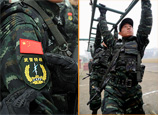
"I often stood under the night sky, staring at the mainland with tears in my eyes," Hu said. "I didn't think I would have a chance to go back home, believing I would have to live and die on the island."
When Hu learned that Taiwan authorities were allowing citizens to return to the mainland, he burst into tears of both joy and sorrow, as his mother had already passed away on the island.
After he retired from the military, Hu finally went back to Hunan via Hong Kong, as the two sides had not established direct flight links at that time.
"I felt excited, but also sad, because I knew some of my relatives were gone," Hu said. "When I saw my uncle, we embraced each other, crying bitterly, as we never thought we would meet again."
Conversely, there are also Taiwanese who ended up living on the mainland due to the civil war. In 1946, 15-year-old Taiwanese Hsu Zhao-lin was sent to the frontline of the civil war on the mainland and stayed there from that point on.
After 42 years, Hsu became head of an association helping veterans in Taiwan return home to the mainland. Hsu received the first group of people to visit their homes in Beijing.
Hsu envied them a great deal, because he, vice chairman of the All-China Federation of Taiwan Compatriots, was not allowed by Taiwan authorities to go back home.
In 1994, Hsu was allowed to go back Taiwan.
The 86-year-old He Biao is another Taiwanese who lived on the mainland. He left his home in Beijing in early 1945 and joined anti-Japanese guerrilla forces at a time when Taiwan was still under Japanese occupation. He never thought that he would have to wait for half a century to go back home.
















 Residential building collapses in E China's Ningbo
Residential building collapses in E China's Ningbo


![]()
